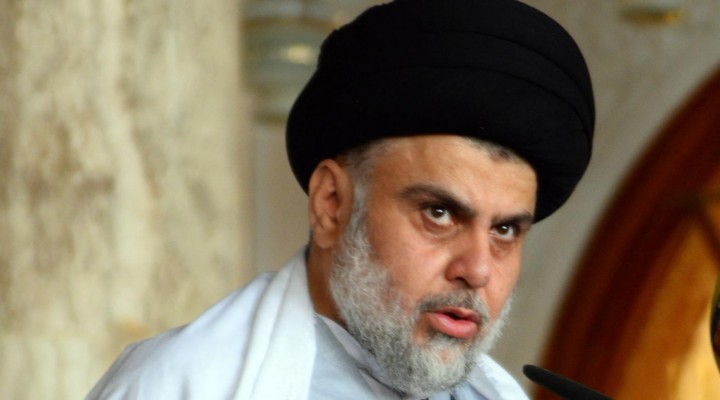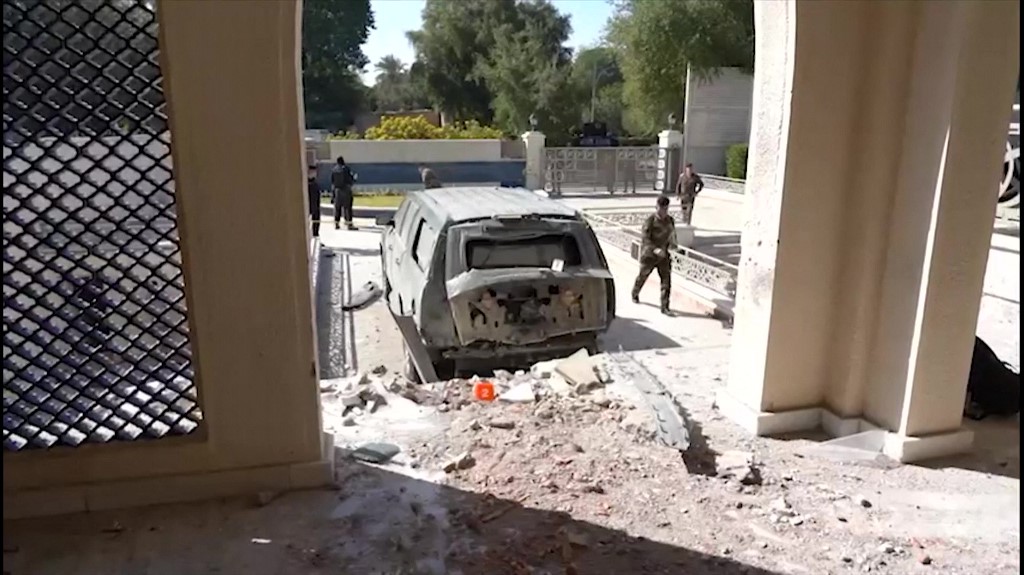Iraq elections: What Muqtada al-Sadr might do next

Sadr’s primary objective is the renaissance of Iraq. Might he use the huge power he wields to try to free the country from Iranian interference and heal the sectarian divide?
Iraq, like many countries, is a place where votes are not only counted but weighed and interpreted. So it is not surprising that there have been resounding recriminations following the 10 October elections – for there has been a major political upset.
Muqtada al-Sadr’s Sairoon Alliance became the major political bloc with 74 seats, thus gaining the privilege of designating the next prime minister. So the cleric “owns” almost half of the 165 MPs needed to win a confidence vote in the 329-member parliament and have a government approved. The main Sunni parties led by Parliament Speaker Mohamed al-Halbousi got 34 seats and the businessman Khamis al-Khanjar 15.
Former Prime Minister Nouri al-Maliki’s State of Law list increased the number of its MPs from 25 to 35, becoming a power-broker in the haggling to follow. However, the biggest shock was the collapse of the pro-Iran party of the Fatah bloc, led by Hadi al-Amiri, which crashed from 60 seats to 17.
As for the Kurds, Masoud Barzani’s Kurdish Democratic Party (KDP) expanded from 25 to 33 seats, increasing his chances of designating a new president of the republic to replace the incumbent Barham Salih.
Political vacuums
Unsurprisingly, the pro-Iran parties cried foul. They claimed fraud had taken place and staged protests. But the ongoing recount is unlikely to alter the outcome significantly. They have to come to terms with one obvious message from the electorate: the vote was a major rejection of, or rebuke to, them.
There is simply no other way of spinning the numbers.
But that is a separate issue from the hard reality of the Iraqi political ritual that follows – forming a government. If previous experience is anything to go by, this could drag on for months and the outcome could be worlds away from the popular will expressed in October.
Political vacuums create instability, as shown by the drone attack on the incumbent Prime Minister Mustafa al-Kadhimi’s residence earlier this month. It is still not known who was behind the attack. Though fingers point to pro-Iran militias, however, most of them denounced the attack as “stupid and uncalculated”, one which had caused great harm to the Shia factions themselves. Abu Ali al-Askari, commander of Kataib Hezbollah, the Shia armed faction most hostile to the prime minister, claimed that none of the factions would bother wasting a drone on Kadhimi’s house.
Since the US invasion of 2003, Iraqi politics, and especially the power to appoint the prime minister, has been in the gift of the Shia community and its leaders, with associated roles played by rival foreign powers the US and Iran.
Will Sadr follow the same script, or will he depart from the unwritten rules of this political quota system? The quota system has perpetuated and safeguarded the powers and privileges of its different component political blocs independently from election results.
Sadr’s heritage
Besides his bloc in parliament, Sadr’s main political asset is that he is the heir of one of the most important families in Shia Islam – a family that traces its lineage right to the Prophet Muhammad. The Sadrs claim direct connection with prominent scholars and immense influence and prestige in Iraq and elsewhere. They led the rebellion against the British in the 1920s.
Imam Musa al-Sadr became the spiritual leader of Lebanese Shia, contributing to their revival before mysteriously disappearing in Libya in 1978. Muhammad Baqir al-Sadr and Mohamed Sadiq al-Sadr (Muqtada’s father) were executed by Saddam Hussein in 1980 and 1999 respectively, and both exerted from their base in Najaf a strong influence among Iraqi Shias and even on the 1979 Iranian Revolution.
Muqtada, a teenager at the time, was confined to house arrest, limited to a single room for almost a decade on the orders of Saddam.
Such a weighty heritage, together with his armed resistance against the US occupation of Iraq between 2003 and 2008, has boosted his political credentials and given him the power to produce, at the drop of a hat, millions of supporters onto the streets of Baghdad from its north-eastern suburban stronghold of Sadr City.
Sadr, according to his supporters, has the power to paralyse the capital on a whim – a card few other Iraqi politicians can play. Considering his increased power after the recent elections, it is time to ask what Sadr actually thinks and how he is assessing Iraq’s political future.
Reliable sources inside his office have offered us some glimpses.
Complex relationship with Iran
Like his predecessors, Sadr rejects a permanent presence of US troops as an occupation or combat force. He is, however, open to a US military presence as trainers and in providing logistical support to the Iraqi army, which he acknowledges is overly dependent on American military procurement.
Sadr has a long and complex relationship with Iran, full of nuances, difficult to grasp for external observers. When he perceives himself to be under threat in Iraq, Sadr frequently spends long periods in Iran. He is aware that relations between the two countries are now unbreakable, but he is also opposed to pro-Iran militias operating inside Iraq and to Tehran’s interference in what he regards as his own country’s internal affairs.
His opposition to pro-Iran militias should not, the sources point out, be confused with an opposition to Hashd al-Shaabi (the Popular Mobilisation Forces or PMF) – that is a far more complex situation.
This is important because western analysis – and I have first-hand experience with this – usually tends to wrongly conflate the PMF and pro-Iran militias.
We have also been told that Sadr favours increased relations with Russia and China to help Iraq’s future development, provided this is done in the interests of Iraq and without any external power of veto. The same is true for Saudi Arabia.
He is also said to be reluctant for Iraq to be dragged into the logic and policies of the Axis of Resistance, an anti-western, anti-Israel, anti-Saudi military and political alliance spearheaded by Iran with Syrian and Hezbollah participation. For Sadr, the primary objective is the renaissance of Iraq and, to this end, the country should stay away from regional political schemes.
Coalition with Sunni parties
To a specific question asking whether Iraq should join the Abraham Accords, normalising relations with Israel, the answer was vehemently negative. Sadr would aim to create a national agenda and free Iraq from the policies of other regional and non-regional powers, which for two decades have been settling their scores on Iraqi soil – prioritising the reconstruction of the country and rejecting any external interference whatsoever.
As for the new Iraqi government, al-Najaf sources point to Sadr’s intention to free himself from most Shia blocs’ vetoes and look for a possible coalition with the Sunni parties of Halbousi and Khanjar and Barzani’s KDP.
Preliminary conclusions to be drawn from what Sadr’s staff has been willing to share is that if the Iraqi leader succeeds in his plan to shape a new government, it would be a clear attempt to overcome the sectarian divide and to promote more coalition governance in Iraq.
These three blocs’ seats combined are close to the threshold of the 165 needed to win a confidence vote, and the joining of minor parties could allow such a target to be reached. Of course, it remains to be seen whether other Shia blocs and power-brokers, mainly Maliki and Ameri, would consent to Sadr’s plan – not to mention the pro-Iran militias. From this point of view, the clumsy drone attack against Khadimi’s house serves more as a warning shot rather than a direct personal threat.
The coalition that Sadr seems to have in mind could nevertheless collide with his intention to free Iraq from external interferences. Such a stance, the reasoning goes, would be put to the test by the influence that Turkey is attributed to have on the Halbousi and Khanjar parties, and by the US’s and Israel’s influence on Barzani’s KDP.
The following weeks in Iraq will be tense. Above all, there is bound to be a reckoning between competing pro-Iranian power blocs in Iraq, if not competing interests within Iran’s Islamic Revolutionary Guards Corps (IRGC) itself.
These are interesting times, and for Esmail Qaani, the IRGC’s commander, not easy ones.
https://www.middleeasteye.net/opinion/iraq-elections-muqtada-sadr-what-do-next
 TheAltWorld
TheAltWorld 

0 thoughts on “Iraq elections: What Muqtada al-Sadr might do next”